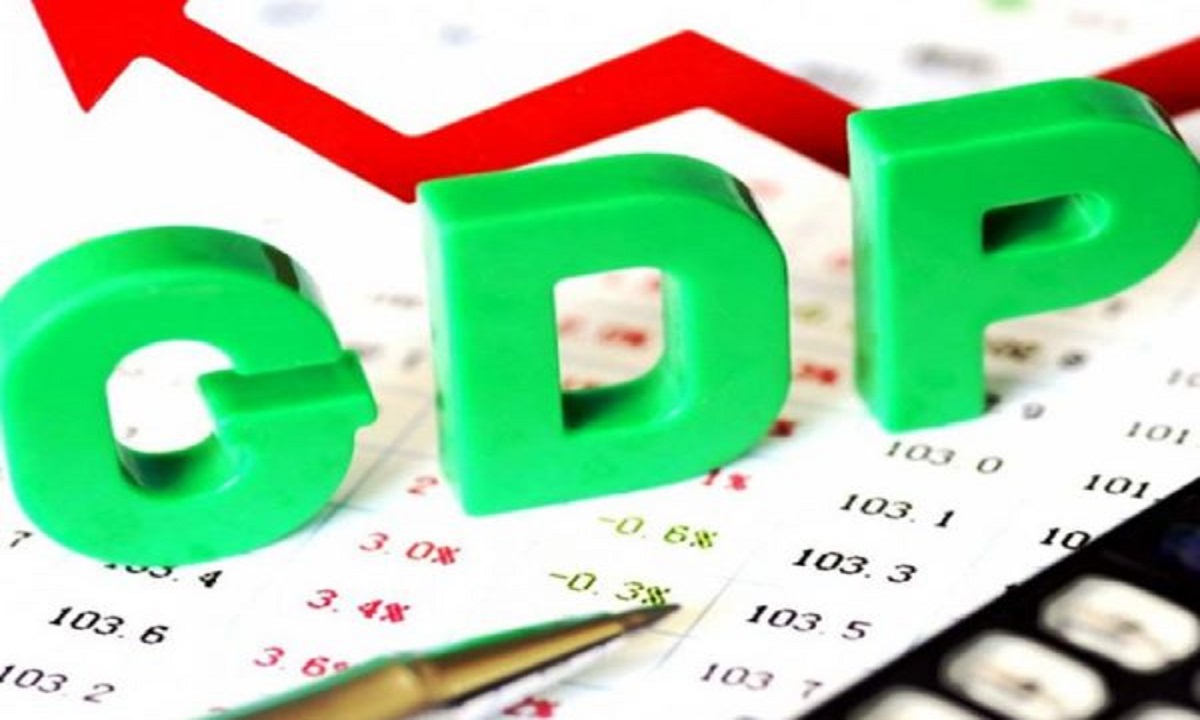News
Nigeria’s GDP Growth Rises to 3.19% in Second Quarter of 2024

Nigeria’s economy showed signs of resilience in the second quarter of 2024, with the nation’s real Gross Domestic Product (GDP) growing by 3.19%, a slight increase from the 2.98% growth recorded in the first quarter of the year. This 0.21 percentage point rise was disclosed by the National Bureau of Statistics (NBS) in its latest GDP report released on Monday.

The report highlighted that the Services sector was the primary driver of this growth, posting a robust 3.79% increase. The sector’s strong performance contributed significantly to the overall economy, accounting for 58.76% of the aggregate GDP in Q2 2024.
The report read; “Nigeria’s Gross Domestic Product (GDP) grew by 3.19 percent (year-on-year) in real terms in Q2’24. This growth rate is higher than the 2.51 percent recorded in the second quarter of 2023 and higher than the Q1’24 growths of 2.98 percent.
“The performance of the GDP in the Q2’24 was driven mainly by the Services sector, which recorded a growth of 3.79 percent and contributed 58.76 percent to the aggregate GDP.
“The agriculture sector grew by 1.41 percent from the growth of 1.5 percent recorded in the second quarter of 2023. The growth of the industry sector was 3.53 percent, an improvement from -1.94 percent recorded in the second quarter of 2023.
“In terms of share of the GDP, the industry and services sectors contributed more to the aggregate GDP in Q2’24 compared to the corresponding quarter of 2023.”
The report also showed that the oil sector grew by 10.15 percent in Q2’24 while the non-oil sector growth was 2.8 percent during the period.
It added; “The nation in the second quarter of 2024 recorded an average daily oil production of 1.41 million barrels per day (mbpd), higher than the daily average production of 1.22 mbpd recorded in the same quarter of 2023 by 0.19 mbpd and lower than the first quarter of 2024 production volume of 1.57 mbpd by 0.16mbpd.
“The real growth of the oil sector was 10.15 percent (year-on-year) in Q2’24, indicating an increase of 23.58 percentage points relative to the rate recorded in the corresponding quarter of 2023 (-13.43 percent). Growth increased by 4.45% points when compared to Q1’24 which was 5.7 percent.
“On a quarter-on-quarter basis, the oil sector recorded a growth rate of -10.51 percent in Q2’24. “The Oil sector contributed 5.7 percent to the total real GDP in Q2’24, up from the figure recorded in the corresponding period of 2023 and down from the preceding quarter, where it contributed 5.34 percent and 6.38 percent respectively.”
The non-oil sector grew by 2.8 percent in real terms during the reference quarter (Q2’24). The report read;
“This rate was lower by 0.78 percentage points compared to the rate recorded in the same quarter of 2023 which was 3.58 percent and relatively same with the 2.8 percent recorded in the first quarter of 2024.
“This sector was driven in the second quarter of 2024 mainly by Financial and Insurance (Financial Institutions); Information and Communication (Telecommunications); Agriculture (Crop production); Trade; and Manufacturing (Food, Beverage, and Tobacco), accounting for positive GDP growth.
“In real terms, the non-oil sector contributed 94.3 percent to the nation’s GDP in the second quarter of 2024, lower than the share recorded in the second quarter of 2023 which was 94.66 percent and higher than the first quarter of 2024 recorded as 93.62 percent.”
News
LIRS to Invoke NTAA to Recover Unpaid Taxes from Bank Accounts, Others

Lagos Internal Revenue Service (LIRS) pursuant to Section 60 of the Nigeria Tax Administration Act (NTAA), plans to ask Nigerian banks to debit bank accounts of employers who failed to remit tax liability.

This was disclosed in a recent notice on Sunday.
LIRS stressed that the move was in line with the implementation of the country’s NTAA and other new tax laws, which took effect on January 1, 2026.
“Where a taxpayer fails, neglects, or refuses to settle any established outstanding tax liability when due, LIRS may exercise its power under Section 60 to direct any of the following persons to pay the amount owed by the taxpayer:
“Banks and other financial institutions; Employers; tenants, debtors, or customers of the taxpayer; Agents, business partners, and any person holding money on behalf of the taxpayer; Any person owing money to the taxpayer, whether presently due or accruing. Once a substitution notice is issued, the person served is statutorily required to remit to LIRS the amount. Specified in the notice from funds belonging to, or payable to, the defaulting taxpayer,” the LIRS notice partly read.
Meanwhile, Taiwo Oyedele, chairman of the Presidential Committee on Fiscal Policy and Tax Reforms, weeks ago ruled out claims that the government would debit personal accounts over tax remittances.
News
Anambra Cuts Monday Pay to Kill Sit-at-Home

Anambra State will implement pro-rata salary payments for civil servants starting February 2026, targeting chronic Monday absenteeism from the long-running sit-at-home order, Information Commissioner Dr. Law Mefor announced Saturday.

Soludo
Speaking at an Awka briefing after the Executive Council’s end-of-tenure retreat, Mefor said improved security and transport have eliminated excuses for the four-year disruption, which cost the state trillions in lost revenue. “Workers enjoyed full pay despite staying away; now, no work means no pay for that day, calculated over 24 working days,” he stated.
Compliance measures include mandatory Monday clock-in forms, with markets urged to reopen fully amid bolstered security. This builds on a January 22 executive order docking 20% pay from teachers absent on Mondays.
Mefor warned that lost Mondays cripple revenue collection and productivity, rejecting alternatives like Saturday shifts as capitulation to agitators.
News
Stakeholders Demand Stronger Governance and Infrastructure to Drive Tech Adoption @ Lagos AI Summit

As AI adoption accelerates across Nigeria, leaders at the “AI in Action Now” conference 2026 have called for a balance between rapid innovation and strict regulatory governance. The event, held at the Lagos Oriental Hotel, highlighted both the doggedness of Nigerian builders and the risks of unregulated data usage.

Dotun Adeoye, Co-Founder of AI Nigeria, raised alarms over “Shadow AI”, a trend where employees upload sensitive official documents to public AI platforms. He praised the Nigerian Data Protection Commission (NDPC) for its recent aggressive stance, including multi-million-dollar fines against major banks and social media brands.
“Innovation without governance is dangerous. The regulator now has the job of educating players. We are working in partnership with them to ensure players don’t just get fined, but actually understand how to protect data locally rather than storing it abroad, ” Adeoye noted.
Addressing issues of lack of infrastructure to carry AI adoption, Conference Convener Debola Ibiyode admitted that while Nigeria lacks the traditional foundation for AI adoption, the tech community cannot afford to wait.

“The simple answer is we don’t have the infrastructure, but Nigeria has never really had infrastructure to drive anything, and we still thrive, ” Iboyode said, encouraging students and builders to look beyond current limitations. “Once we start to build based on what we have now, it will encourage those who need to provide the infrastructure to do their part. The world will not wait for us,” she insisted.
To bridge this gap, she highlighted the AI Foundry Africa, an incubator designed to mentor ideas into market-ready products.
Meanwhile, speaking to journalists on the sidelines, Biodun Ogunleye, the Lagos State Commissioner of Energy and Mineral Resources, echoed the sentiment that the government’s role is to facilitate the right environment through partnership. He emphasized that data generated from interactions with the government must have long-term value.
“We must ensure that in all facets from production to interaction with government, the tools required to ensure data has value are appreciated,” Ogunleye stated.
He concluded that through private-sector collaboration, the government can focus on its primary functions while leveraging AI to ensure the nation aspires for the future.

 General News3 days ago
General News3 days agoPalmPay User Shares Experience on Fintech Apps to Trust in Nigeria

 News3 days ago
News3 days agoStakeholders Demand Stronger Governance and Infrastructure to Drive Tech Adoption @ Lagos AI Summit

 General News3 days ago
General News3 days agoNigerians Target Self-Improvement, Business Startups in 2026 Google Data

 News3 days ago
News3 days ago35 Million Nigerians Face Acute Hunger in 2026, UN Warns

 General News3 days ago
General News3 days agoHow Inside Jobs and Policy Shocks Trigger Nigeria’s Rising Loan Crisis

 News20 hours ago
News20 hours agoAnambra Cuts Monday Pay to Kill Sit-at-Home

 E-Financial20 hours ago
E-Financial20 hours agoFirst Asset Management Receives Upgraded Ratings from Agusto &Co and DataPro

 General News20 hours ago
General News20 hours agoNigeria Treats Religious Violence as Attack on State – NSA Ribadu

























